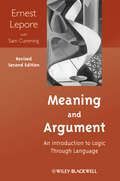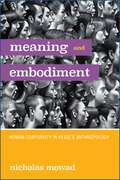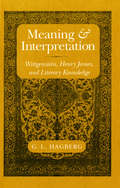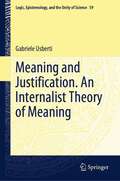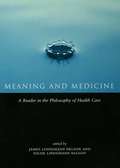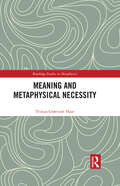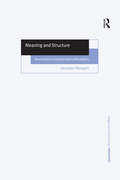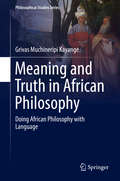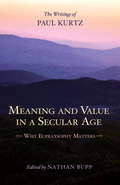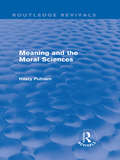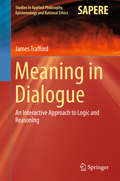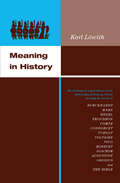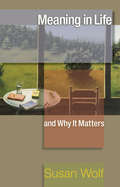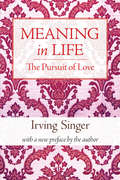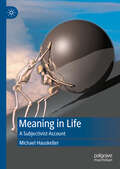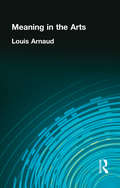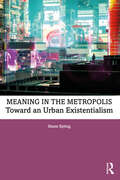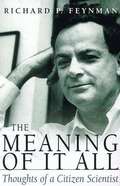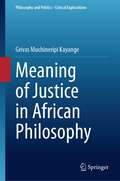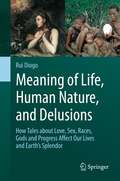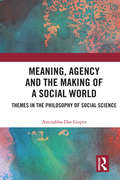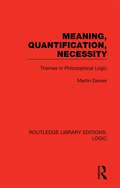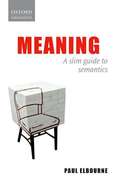- Table View
- List View
Meaning and Argument: An Introduction to Logic Through Language
by Ernest Lepore Sam CummingMeaning and Argument is a popular introduction to philosophy of logic and philosophy of language. Offers a distinctive philosophical, rather than mathematical, approach to logic Concentrates on symbolization and works out all the technical logic with truth tables instead of derivations Incorporates the insights of half a century's work in philosophy and linguistics on anaphora by Peter Geach, Gareth Evans, Hans Kamp, and Irene Heim among others Contains numerous exercises and a corresponding answer key An extensive appendix allows readers to explore subjects that go beyond what is usually covered in an introductory logic course Updated edition includes over a dozen new problem sets and revisions throughout Features an accompanying website at http://ruccs.rutgers.edu/~logic/MeaningArgument.html
Meaning and Authenticity
by Brian J. BramanThe language of self-fulfillment, self-realization, and self-actualization (in short, 'authenticity') has become common in contemporary culture. The desire to be 'authentic' is implicitly a desire to shape one's self in accordance with an ideal, and the concern for what it means to be authentic is, in many ways, the modern form of the ancient question "what is the life of excellence?" However, this notion of authenticity has its critics, Christopher Lasch, for instance, who equates it with a form of narcissism and Theodor Adorno who views it as a glorification of privatism.Brian J. Braman argues that, despite criticisms, it is possible to speak about human authenticity as something that addresses contemporary concerns as well as the ancient preoccupation with the nature of the good life. He refers to the theories of Bernard Lonergan and Charles Taylor, thinkers who placed a high value on the search for human authenticity. Lonergan discusses authenticity in terms of a three-fold conversion with intellectual, moral, and religious implications while Taylor views it as a rich, vibrant, and important addition to conversations about what it means to be human.Meaning and Authenticity presents an engaging dialogue between two thinkers, both of whom maintain that there is a normative conception of authentic human life that overcomes moral relativism, narcissism, privatism, and the collapse of the public self.
Meaning and Embodiment: Human Corporeity in Hegel's Anthropology
by Nicholas MowadMeaning and Embodiment provides a detailed study of Hegel's anthropology to examine the place of corporeity or embodiment in human life, identity, and experience. In Hegel's view, to be human means in part to produce one's own spiritual embodiment in culture and habits. Whereas for animals nature only has meaning relative to biological drives, humans experience meaning in a way that transcends these limits, and which allows for aesthetic appreciation of beauty and sublimity, nihilistic feelings of meaninglessness, and the complex and different systems of symbolic speech and action characterizing language and culture. By elucidating the different forms of embodiment, Nicholas Mowad shows how for Hegel we are embodied in several different ways at once: as extended, subject to physical-chemical forces, living, and human. Many difficult problems in philosophy and everyday experience come down to using the right concept of embodiment. Mowad traces Hegel's account through the growth and development of the body, gender and racial difference, cycles of sleep and waking, and sensibility and mental illness.
Meaning and Humour
by Andrew GoatlyHow are humorous meanings generated and interpreted? Understanding a joke involves knowledge of the language code (a matter mostly of semantics) and background knowledge necessary for making the inferences to get the joke (a matter of pragmatics). This book introduces and critiques a wide range of semantic and pragmatic theories in relation to humour, such as systemic functional linguistics, speech acts, politeness and relevance theory, emphasising not only conceptual but also interpersonal and textual meanings. Exploiting recent corpus-based research, it suggests that much humour can be accounted for by the overriding of lexical priming. Each chapter's discussion topics and suggestions for further reading encourage a critical approach to semantic and pragmatic theory. Written by an experienced lecturer on the linguistics of the English language, this is an entertaining and user-friendly textbook for advanced students of semantics, pragmatics and humour studies.
Meaning and Interpretation: Wittgenstein, Henry James, and Literary Knowledge
by G. L. Hagberg'What is the meaning of a word?' In this thought-provoking book, Hagberg demonstrates how this question—which initiated Wittgenstein's later work in the philosophy of language—is significant for our understanding not only of linguistic meaning but of the meaning of works of art and literature as well.
Meaning and Justification. An Internalist Theory of Meaning (Logic, Epistemology, and the Unity of Science #59)
by Gabriele UsbertiThis volume develops a theory of meaning and a semantics for both mathematical and empirical sentences inspired to Chomsky’s internalism, namely to a view of semantics as the study of the relations of language not with external reality but with internal, or mental, reality. In the first part a theoretical notion of justification for a sentence A is defined, by induction on the complexity of A; intuitively, justifications are conceived as cognitive states of a particular kind. The main source of inspiration for this part is Heyting’s explanation of the intuitionistic meaning of logical constants.In the second part the theory is applied to the solution of several foundational problems in the theory of meaning and epistemology, such as Frege’s puzzle, Mates’ puzzle about synonymy, the paradox of analysis, Kripke’s puzzle about belief, the de re/de dicto distinction, the specific/non-specific distinction, Gettier’s problems, the paradox of knowability, and the characterization of truth. On a more general philosophical level, throughout the book the author develops a tight critique of the neo-verificationism of Dummett, Prawitz and Martin-Löf, and defends a mentalist interpretation of intuitionism.
Meaning and Medicine: A Reader in the Philosophy of Health Care (Reflective Bioethics Ser.)
by Hilde Lindemann NelsonA chief aim of this resource is to rekindle interest in seeing health care not solely as a set of practices so problematic as to require ethical analysis by philosophers and other scholars, but as a field whose scrutiny is richly rewarding for the traditional concerns of philosophy.
Meaning and Metaphysical Necessity (Routledge Studies in Metaphysics)
by Tristan Grøtvedt HazeThis book is about the idea that some true statements would have been true no matter how the world had turned out, while others could have been false. It develops and defends a version of the idea that we tell the difference between these two types of truths in part by reflecting on the meanings of words. It has often been thought that modal issues—issues about possibility and necessity—are related to issues about meaning. In this book, the author defends the view that the analysis of meaning is not just a preliminary to answering modal questions in philosophy; it is not merely that before we can find out whether something is possible, we need to get clear on what we are talking about. Rather, clarity about meaning often brings with it answers to modal questions. In service of this view, the author analyzes the notion of necessity and develops ideas about linguistic meaning, applying them to several puzzles and problems in philosophy of language. Meaning and Metaphysical Necessity will be of interest to scholars and advanced students working in metaphysics, philosophy of language, and philosophical logic.
Meaning and Structure: Structuralism of (Post)Analytic Philosophers (Ashgate New Critical Thinking in Philosophy)
by Jaroslav PeregrinIn Meaning and Structure, Peregrin argues that recent and contemporary (post)analytic philosophy, as developed by Quine, Davidson, Sellars and their followers, is largely structuralistic in the very sense in which structuralism was originally tabled by Ferdinand de Saussure. The author reconstructs de Saussure's view of language, linking it to modern formal logic and mathematics, and reveals close analogies between its constitutive principles and the principles informing the holistic and neopragmatistic view of language put forward by Quine and his followers. Peregrin also indicates how this view of language can be made compatible with what is usually called 'formal semantics'. Drawing on both the Saussurean tradition and recent developments in analytic philosophy of language, this book offers a unique study of the ways in which the concept of meaning can be seen as consisting in the concept of structure.
Meaning and Truth in African Philosophy: Doing African Philosophy with Language (Philosophical Studies Series #135)
by Grivas Muchineripi KayangeThis book offers a new way of doing African philosophy by building on an analysis of the way people talk. The author bases his investigation on the belief that traditional African philosophy is hidden in expressions used in ordinary language. As a result, he argues that people are engaging in a philosophical activity when they use expressions such as taboos, proverbs, idioms, riddles, and metaphors. The analysis investigates proverbs using the ordinary language approach and Speech Act theory. Next, the author looks at taboos using counterfactual logic, which studies the meaning of taboo expressions by departing from a consideration of their structure and use. He argues that the study of these figurative expressions using the counterfactual framework offers a particular understanding of African philosophy and belief systems. The study also investigates issues of meaning and rationality departing from a study on riddles, explores conceptual metaphors used in conceptualizing the notion of politics in modern African political thought, and examines language and marginalization of women and people with disabilities. The book differs from other works in African philosophy in the sense that it does not claim that Africans have a philosophy as is commonly done in most studies. Rather, it reflects and unfolds philosophical elements in ordinary language use. The book also builds African Conception of beauty and truth through the study of language.
Meaning and Value in a Secular Age
by Nathan Bupp Paul KurtzThe secular age has confronted human beings with a fundamental challenge. While the naturalistic worldview rooted in science has persuasively shown that traditional religious conceptions of the universe are unsustainable, it has so far offered no compelling secular narratives to replace the religious narratives so entrenched in civilization. In the absence of religion, how do thoughtful contemporary individuals find meaning in a secular world? This book argues for a new approach called eupraxsophy, a term first coined in 1988 to characterize a secular orientation to life that stands in contrast to religion. Derived from three ancient Greek roots, eupraxsophy literally means "good practice and wisdom." Drawing upon philosophy, science, and ethics, eupraxsophy provides a thoroughly secular moral vision, which respects the place of human values in the context of the natural world and presents an empirically responsible yet hopeful picture of the human situation and the cosmos in which we abide. For the first time, Paul Kurtz's key writings about the theory and practice of eupraxsophy are together in one volume. Written with eloquence and scope, these incisive essays show how Kurtz's brand of humanism moves above and beyond the current "new atheism." Eupraxsophy successfully bridges the cultural divide between science and value and provides a genuine and constructive alternative to religion. With an informative introduction, this book places the concept of eupraxsophy in historical perspective and shows why it is critically important, and relevant, today.
Meaning and the Moral Sciences (Routledge Revivals)
by Hilary PutnamFirst published in 1978, this reissue presents a seminal philosophical work by professor Putnam, in which he puts forward a conception of knowledge which makes ethics, practical knowledge and non-mathematic parts of the social sciences just as much parts of 'knowledge' as the sciences themselves. He also rejects the idea that knowledge can be demarcated from non-knowledge by the fact that the former alone adheres to 'the scientific method'. The first part of the book consists of Professor Putnam's John Locke lectures, delivered at the University of Oxford in 1976, offering a detailed examination of a 'physicalist' theory of reference against a background of the works of Tarski, Carnap, Popper, Hempel and Kant. The analysis then extends to notions of truth, the character of linguistic enquiry and social scientific enquiry in general, interconnecting with the great metaphysical problem of realism, the nature of language and reference, and the character of ourselves.
Meaning in Dialogue
by James TraffordThis book argues for a view in which processes of dialogue and interaction are taken to be foundational to reasoning, logic, and meaning. This is both a continuation, and a substantial modification, of an inferentialist approach to logic. As such, the book not only provides a critical introduction to the inferentialist view, but it also provides an argument that this shift in perspective has deep and foundational consequences for how we understand the nature of logic and its relationship with meaning and reasoning. This has been upheld by several technical results, including, for example a novel approach to logical paradox and logical revision, and an account of the internal justification of logical rules. The book shows that inferentialism is greatly strengthened, such that it can answer the most stringent criticisms of the view. This leads to a view of logic that emphasizes the dynamics of reasoning, provides a novel account of the justification and normativity of logical rules, thus leading to a new, attractive approach to the foundations of logic. The book addresses readers interested in philosophy of language, philosophical and mathematical logic, theories of reasoning, and also those who actively engage in current debates involving, for example, logical revision, and the relationship between logic and reasoning, from advanced undergraduates, to professional philosophers, mathematicians, and linguists.
Meaning in History: The Theological Implications of the Philosophy of History, Traced through the Works of Burckhardt, Marx, Hegel, Proudhon, Comte, Condorcet, Turgot, Voltaire, Vico, Bossuet, Joachim, Augustine, Orosius, and The Bible
by Karl LöwithModern man sees with one eye of faith and one eye of reason. Consequently, his view of history is confused. For centuries, the history of the Western world has been viewed from the Christian or classical standpoint—from a deep faith in the Kingdom of God or a belief in recurrent and eternal life-cycles. The modern mind, however, is neither Christian nor pagan—and its interpretations of history are Christian in derivation and anti-Christian in result. To develop this theory, Karl Löwith—beginning with the more accessible philosophies of history in the nineteenth and eighteenth centuries and working back to the Bible—analyzes the writings of outstanding historians both in antiquity and in Christian times. "A book of distinction and great importance. . . . The author is a master of philosophical interpretation, and each of his terse and substantial chapters has the balance of a work of art."—Helmut Kuhn, Journal of Philosophy
Meaning in Life and Why It Matters (The University Center for Human Values Series #40)
by Susan WolfA fresh reflection on what makes life meaningfulMost people, including philosophers, tend to classify human motives as falling into one of two categories: the egoistic or the altruistic, the self-interested or the moral. According to Susan Wolf, however, much of what motivates us does not comfortably fit into this scheme. Often we act neither for our own sake nor out of duty or an impersonal concern for the world. Rather, we act out of love for objects that we rightly perceive as worthy of love—and it is these actions that give meaning to our lives. Wolf makes a compelling case that, along with happiness and morality, this kind of meaningfulness constitutes a distinctive dimension of a good life. Written in a lively and engaging style, and full of provocative examples, Meaning in Life and Why It Matters is a profound and original reflection on a subject of permanent human concern.
Meaning in Life, Volume 2: The Pursuit of Love (The Irving Singer Library)
by Irving SingerAn acclaimed philosopher offers a systematic mapping of the various facets of love.In his widely acclaimed trilogy The Nature of Love, Irving Singer traced the development of the concept of love in history and literature from the Greeks to the twentieth century. In this second volume of his Meaning in Life trilogy, Singer returns to the subject of his earlier work, exploring a different approach. Without denying his previous emphasis on the role of imagination and creativity, in this book Singer investigates the ability of them both to make one's life meaningful. A “systematic mapping” of the various facets of love (including sexual love, love in society, and religious love), The Pursuit of Love is an extended essay that offers Singer's own philosophical and psychological theory of love.Rich in insight into literature, the history of ideas, and the complexities of our being, The Pursuit of Love is a thought-provoking inquiry into fundamental aspects of all human relationships.
Meaning in Life: A Subjectivist Account
by Michael HauskellerThis book develops and defends a subjectivist account of meaning in life, which holds that the only place that meaning can ever be found is in the way we experience the living of our lives. Many philosophers consider that a life can only be meaningful if it meets certain objective standards. For a life to be meaningful, they insist, it needs to make a difference and contribute something important, something that is of value, and not just for the person whose life it is. In contrast, this book contends that meaningfulness is not an objective quality of lives, nor is it in some way dependent on such a quality. Meaning is not like truth, which is commonly thought to be an objective quality of propositions. Statements or beliefs are not true simply because someone thinks or feels that they are true. Something can appear true that is in fact false. But a person cannot feel their life to be meaningful, while in fact it is not, because meaning does not depend on the presence of certain features without which no life can be rightly considered meaningful. The book therefore concludes that many people live a meaningful life. Meaning is not the prerogative of an elite minority. It is not a measure of human accomplishments. This book will be essential reading for philosophers and postgraduate students researching the meaning of life and is also suitable for use in teaching on philosophy courses at university level.
Meaning in the Arts
by Louis Arnaud ReidFirst published in 2002. Routledge is an imprint of Taylor & Francis, an informa company.
Meaning in the Metropolis: Toward an Urban Existentialism
by Shane EptingThis book will benefit readers by revealing how urban existence is a multifaceted affair that, once examined, will forever change the way they think about their place in the city and what it means to live in one.Engaging in urban existentialism requires interrogating the idea of “The City,” delving into the facets of its conception. The lights, sounds, exquisite buildings, art, culture, and, most importantly, the endless possibilities entice people. They are where your wildest dreams of love, success, and happiness can come true. Yet, reality can stymie those aspirations. However, if you can make it there, you can make it anywhere. The reason is that many urban places, as hypercompetitive networks of socio-material arrangements, test you at every turn. They mold urban dwellers into adaptable beings who can survive the torment of traffic, bad weather, displeasing persons, and grueling work—all before lunch. Despite such complexity, what we want is probably simple: people to love, to be loved, a safe place to call home, good food, acceptance of oneself, and the ability to pursue a fulfilling existence through work and recreation. Like cities, nothing is that simple. Examining the built environment reveals competing interests between several stakeholder groups, and how each person relates to others remains at the center of such an enterprise. Questioning one’s place among others is at the heart of this book, and it can help you find meaning in the metropolis.Meaning in the Metropolis will interest philosophers, graduate students, maverick urban planners, and city lovers looking for meaning in the places they call home.
Meaning of It All: Thoughts of a Citizen Scientist
by Richard FeynmanThis three-part public lecture that Richard Feynman gave at the University of Washington in 1963 shows us another side of Feynman, as he expounds on the inherent conflict between science and religion, peoples' distrust of politicians, and our universal fascination with flying saucers, faith healing, and mental telepathy.
Meaning of Justice in African Philosophy (Philosophy and Politics - Critical Explorations #28)
by Grivas Muchineripi KayangeThe book examines the meaning of justice in African political philosophy, building on the use-theoretical approach. Currently, most of the philosophical works in this context advocate for a communal interpretation of the meaning of justice, such as the 'relational theory of justice' and 'Ubuntu justice as fairness.' The author argues that this foundation of justice in the community undermines the self, which is a major problem with these theories. As an attempt to go beyond communitarianism in African thought, the book recognizes other philosophical frameworks for elaborating the meaning of justice in ordinary people's experience, such as vitalism, theism, ubuntuism, and semantic framework. The author opts for a reconstructed ubuntu-based theory of the meaning of justice that reflects the traditional African experience and recuperates 'valuing self-existence' and 'valuing other-existence' as its foundations. The book further identifies the centrality of rights in defining justice in traditional African communities.
Meaning of Life, Human Nature, and Delusions: How Tales about Love, Sex, Races, Gods and Progress Affect Our Lives and Earth's Splendor
by Rui DiogoWhatever are your beliefs, background, education, political views or interests, one thing is sure: this book will engage you, teach you something new, and more importantly make you to re-think deeply about critical aspects of your daily-life, including sex, love, food, physical activities, diseases, work and stress, and how you see and deal with other people, other animals, and the planet in general. Indeed, it focuses on topics that have fascinated people from all places and historical periods since times immemorial: Why are we here? What is the meaning of life? Are we progressing, and will we thrive? It does this by integrating in a unique fashion information from ancient Greek, Sumerian, Hindu, Jewish, Buddhist, Christian and Muslim texts to high-tech brain research, facts about near-death experiences, Covid-19, QAnon conspiracies, virtual reality and dating aps; from Adam and Eve to the rise of misogyny and racism to Black Lives Matter, Me-Too, Hollywood romantic movies and Disney fairy-tales. Contrary to notions about 'human progress' and 'Homo Deus' defended by authors such as Harari, Pinker and Dawkins, it shows that human history instead involves the repetition of similar imaginary tales created by a combination of traits found in other animals and the uniquely human obsession about 'cosmic purpose' stories related to our awareness of death's inevitability. Organized religions appeared later, chiefly during the rise of agriculture and 'civilizations'. Diogo navigates mesmerizing untold stories revealing a paradox: these events and the industrial 'revolution' increased inequality, oppression, slavery, subjugation of women, famines, plagues, 'work', stress, and suicides. Data from psychology, biology, neurobiology, and cross-cultural studies of hunter-gatherers and so-called 'developed' societies reveal an even more profound paradox: within all forms of life, the 'sapient being' is the one immersed in Neverland's world of unreality - truly a Homo irrationalis, fictus and socialis believing in fictional tales about cosmic 'duties', 'romantic meant to be', demons, inferior 'races' and 'genders', conspiracies, and 'justified' slavery, warfare, genocides, and animal abuses. Importantly, such tales play, on the other hand, crucial functions such as help coping with death and a plethora of societal troubles, decreasing stress, or preventing drug and alcohol abuse. An optimist and passionate wondered and wanderer, Diogo provides enthralling details about the history of religion, discrimination, romantic love, warfare, diseases and Earth's biodiversity illustrating how 'virtue is in the middle' and that we - with our intriguing combination of beliefs, bodily needs and desires, artistic abilities, and mismatches between our senses' illusions and the cosmos' reality - are not 'better' or 'worse' than the other millions of captivating living species. This powerful and urgently needed message has critical repercussions for how we understand, care about, and mindfully enjoy living in this splendid planet, in the reality of here and now.Pre-publication comments: "I applaud the enormous work that Diogo has invested in this follow-up to his widely acclaimed Evolution driven by organismal behavior book, and the challenge of getting people to think beyond and outside of our usual set of definitions and expectations. The case-studies provided in the book are fascinating and insightful" (Drew Noden, Award-winning Emeritus Professor, Cornell University)"Rui Diogo is becoming the Slavoj Zizek of evolutionary biology" (Marcelo Sanchez-Villagra, Director of the Paleontological Institute and Museum of the University of Zurich)
Meaning, Agency and the Making of a Social World: Themes in the Philosophy of Social Science
by Amitabha Das GuptaThis book explores a vital but neglected element in the philosophy of social science – the complex nature of the social world. By a systematic philosophical engagement, it conceives the social world in terms of three basic concerns: epistemic, methodological and ethical. It examines how we cognize, study and ethically interact with the social world. As such, it demonstrates that a discussion of ethics is epistemically indispensable to the making of the social world. The book presents a new interpretation of philosophy of social science and addresses a series of related topics, including the role of the human subject in the context of scientific knowledge, objectivity, historicity, meaning and nature of social reality, social and literary theory, scientific methodology and fact/value dichotomy, human and collective agency and the limits to relativism. Examining each in turn, it argues that the social world is constructed through human actions and becomes significant because we ascribe meaning to it. This is organized around discussions on the meaning, agency and the making of a social world. The book will be useful to scholars and researchers of philosophy of social science, political philosophy and sociology.
Meaning, Quantification, Necessity: Themes in Philosophical Logic (Routledge Library Editions: Logic)
by Martin DaviesOriginally published in 1981. This is a book for the final year undergraduate or first year graduate who intends to proceed with serious research in philosophical logic. It will be welcomed by both lecturers and students for its careful consideration of main themes ranging from Gricean accounts of meaning to two dimensional modal logic. The first part of the book is concerned with the nature of the semantic theorist’s project, and particularly with the crucial concepts of meaning, truth, and semantic structure. The second and third parts deal with various constructions that are found in natural languages: names, quantifiers, definite descriptions, and modal operators. Throughout, while assuming some familiarity with philosophical logic and elementary formal logic, the text provides a clear exposition. It brings together related ideas, and in some places refines and improves upon existing accounts.
Meaning: A Slim Guide To Semantics
by Paul ElbourneThis book offers an introduction to the analysis of meaning. Our outstanding ability to communicate is a distinguishing feature of our species. To communicate is to convey meaning, but what is meaning? How do words combine to give us the meanings of sentences? And what makes a statement ambiguous or nonsensical? These questions and many others are addressed in Paul Elbourne's fascinating guide. He opens by asking what kinds of things the meanings of words and sentences could be: are they, for example, abstract objects or psychological entities? He then looks at how we understand a sequence of words we have never heard before; he considers to what extent the meaning of a sentence can be derived from the words it contains and how to account for the meanings that can't be; and he examines the roles played by time, place, and the shared and unshared assumptions of speakers and hearers. He looks at how language interacts with thought and the intriguing question of whether what language we speak affects the way we see the world. Meaning, as might be expected, is far from simple. Paul Elbourne explores its complex issues in crystal clear language. He draws on approaches developed in linguistics, philosophy, and psychology - assuming a knowledge of none of them -in a manner that will appeal to everyone interested in this essential element of human psychology and culture.
